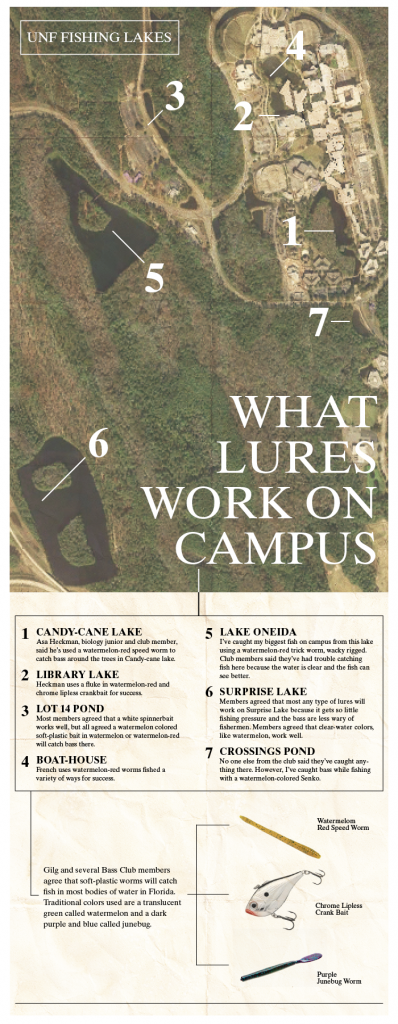During the school year, I would wake up early just to make a cast into Candy Cane Lake. If I had time between classes, I would hike over to the bridge on Lake Oneida to change up the scenery. At one point, I realized I found the perfect school at UNF — I get to go bass-fishing whenever I want and I don’t even have to leave campus. After visiting several other state universities like UF and FSU, I learned UNF is the only in Florida school with lakes that are not only on campus, but are also fishable.
Matt Gilg, Ph.D., Professor of Biology and UNF Bass Club Advisor, said fishing is good for students to have an escape, and it can be a way to clear your head. Fishing is exciting and challenging. You always have to keep thinking about what your next move will be and where you will cast. Think about what the fish might bite and where they will be. Sometimes it just helps get your mind off of other things.
“But you have to keep your priorities straight,” Gilg said. “Make sure you’re getting your education.” When Gilg was a student in Nebraska, his grades would drop when the lakes thawed because he would spend most of his time fishing and wouldn’t be able to concentrate on his school work. Members of the UNF Bass Club, like myself, fish around campus, and participate in off-campus tournaments while keeping our grades above water.
The History of UNF’s Bass Populations
The largemouth bass, also called a black bass, is a popular freshwater game fish known for its aggressive behavior. And let’s not forget that Florida is the bass-fishing capital of the United States. Lake Oneida and Surprise Lake are the oldest lakes on UNF’s campus, and, as Environmental Center Ecologist Justin Lemmons said, should hold the bigger, older populations of bass. He said most fish were stocked in the lakes.
Gilg said some fish get here by swimming through the Florida Aquifer and emerging in our lakes when the water level rises.
The older lakes that have a stable population of forage — smaller fish like a bluegill or sunfish — hold more bass. The smaller, younger lakes that don’t have a forage population can’t as easily sustain bass. Lemmons said the smaller lakes will have some fish in them, but the bass haven’t had time to grow and are still small. The fish are harder to find and catch in the smaller lakes because there aren’t many bass in there.

A few simple rules
1. No live bait, artificials only. It’s important not to fish with live bait because it could introduce a non-native species that could be carrying parasites.
2. Catch-and-release only. “[This] way you don’t overexploit the ecosystem,” Lemons said. “If everyone took what they caught, you are decreasing the population and then you would be left with nothing.”
3. Don’t feed the alligators. Gilg explained that feeding the alligators will teach them not to fear human interaction and will cause the alligators to become comfortable with people. This is dangerous.
4. Pick up your trash. Especially since UNF is located on a nature preserve, the Sawmill Slough Preserve.
Pro-tips for fishing on campus
1. Watch your back-cast, Bass Club President and criminal justice senior Evan French warned. When your rod and bait are behind you before you make a cast, you might hit someone or even get hung in a tree.
2. The worst case scenario for fishing on campus, Gilg said, is accidentally stumbling on an alligator’s nest. Otherwise, there aren’t many ways to get hurt.
3. Be cautious of geese nests, especially when mothers are with their young, French said. The geese will chase you away from your fishing spot.
4. Turtles will often chase after a lure, but are often too slow to actually strike it.
5. If you see another fisherman catching fish, Gilg said, don’t intrude on the fishing hole.
If you’re interested in bass-fishing but don’t know where to start, talk to someone you see fishing. Chances are he or she is in the Bass Club.
You can also come to a club meeting, join the Facebook page or email mgilg@unf.edu for more information.
[doptg id=”6″]Email Brandon Thigpen at reporter2@unfspinnaker.com







